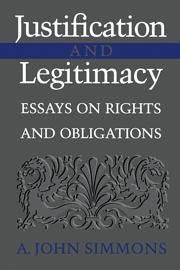Book contents
- Frontmatter
- Contents
- Introduction
- Acknowledgments
- 1 The Principle of Fair Play
- 2 Fair Play and Political Obligation: Twenty Years Later
- 3 The Obligations of Citizens and the Justification of Conscription
- 4 Associative Political Obligations
- 5 External Justifications and Institutional Roles
- 6 Philosophical Anarchism
- 7 Justification and Legitimacy
- 8 “Denisons” and “Aliens”: Locke's Problem of Political Consent
- 9 Human Rights and World Citizenship: The Universality of Human Rights in Kant and Locke
- 10 Original-Acquisition Justifications of Private Property
- 11 Historical Rights and Fair Shares
- 12 Makers' Rights
- Index
7 - Justification and Legitimacy
Published online by Cambridge University Press: 05 June 2012
- Frontmatter
- Contents
- Introduction
- Acknowledgments
- 1 The Principle of Fair Play
- 2 Fair Play and Political Obligation: Twenty Years Later
- 3 The Obligations of Citizens and the Justification of Conscription
- 4 Associative Political Obligations
- 5 External Justifications and Institutional Roles
- 6 Philosophical Anarchism
- 7 Justification and Legitimacy
- 8 “Denisons” and “Aliens”: Locke's Problem of Political Consent
- 9 Human Rights and World Citizenship: The Universality of Human Rights in Kant and Locke
- 10 Original-Acquisition Justifications of Private Property
- 11 Historical Rights and Fair Shares
- 12 Makers' Rights
- Index
Summary
In this chapter I will discuss the relationship between two of the most basic ideas in political and legal philosophy: the justification of the state and state legitimacy. I plainly cannot aspire here to a complete account of these matters, but I hope to be able to say enough to motivate a way of thinking about the relation between these notions that is, I believe, superior to the approach which seems to be dominant in contemporary political philosophy. Today, showing that a state is justified and showing that it is legitimate are typically taken to require the very same arguments. I will argue that this contemporary stance obscures the difference between two central ways in which we should (and do) morally evaluate states, and it generates confusions about other serious practical issues, such as those surrounding our moral obligations to comply with law.
I begin (in Secs. I and II) with brief discussions of the ideas of justification and legitimacy and with an attempt to capture what ought to be most central in our concerns about these ideas. I turn then (in Sec. III) to two basic ways of thinking about the relation between justification and legitimacy that I want to distinguish: what I will call the Lockean and the Kantian approaches. Next (in Sec. IV), I argue that the minority Lockean approach to this issue captures essential features of institutional evaluation that the majority Kantian approach does not, and I add (in Sec. V) brief mention of one further complication facing any adequate account of political evaluation.
- Type
- Chapter
- Information
- Justification and LegitimacyEssays on Rights and Obligations, pp. 122 - 157Publisher: Cambridge University PressPrint publication year: 2000
- 7
- Cited by



